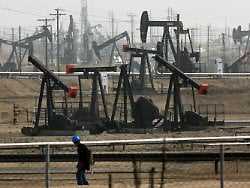Unbridled rise
Oil price worries central bankers
2/14/2022, 3:14 p.m
Consumers are not only feeling the inexorable rise in oil prices at the petrol pump. The energy source makes almost everything expensive, from heating to food, and inflation is picking up speed. But the central banks are in a quandary, and OPEC seems unable to act.
Oil prices are rising at a rate exceeding most analysts’ expectations and could have a dramatic impact on the global economy. After the prices for a barrel of both the North Sea oil Brent and the US variety WTI have clearly passed the 90 dollar mark, according to the experts from the major banks and commodity traders it is only a matter of time before the 100 dollar Limit reached and probably also exceeded. Crude oil has not been this expensive since the summer of 2014.
Analyzes by the US banks Morgan Stanley and Goldman Sachs, for example, who only just raised their forecasts for the oil price from 90 and 80 dollars respectively to 100 dollars in the summer of this year, have almost been overtaken by the rapid development. The Bank of America, on the other hand, even expects prices of $117 for WTI and $120 for Brent oil in July.
Oil prices are already more than 50 percent higher than a year ago, making them one of the main drivers of inflation. As an important source of energy, oil in the form of heating oil or refined into gasoline and as a raw material for many consumer goods accounts for a significant part of consumer spending. Fuel prices in Germany are already at record levels, and heating oil has not cost as much for around ten years.
The energy costs, which are influenced by the price of oil, also indirectly drive up the prices of food, for example. According to Bloomberg calculations, a rise in the price of oil to $100 during February would add another half a percentage point to inflation in both the US and Europe.
Fracking as a way out?
At the same time, the rise in oil prices, which has the effect of a drastic tax increase on most companies, is slowing down the global economy’s recovery from the Corona crisis. Investment bank JPMorgan warns that global economic growth is likely to grind to a halt at around $150 in oil prices, while inflation would rise above 7%. This development, high inflation combined with economic stagnation, is causing particular headaches for central banks such as the European Central Bank and the US Federal Reserve. Because interest rate increases, the standard tool used by monetary watchdogs to curb inflation, always have a slowing effect on economic growth. The central bankers could soon find themselves forced to choose between two evils – high inflation or weak growth with high unemployment.
Concerns that Russia, which exports more than ten percent of the crude oil traded worldwide, will invade Ukraine has recently accelerated the rise in prices. But the reasons for the development lie deeper. Global crude oil demand has recovered from the slump in the Corona crisis faster than expected. Unlike previous phases of the pandemic, the omicron wave had almost no impact on the economy’s appetite for energy in most countries. This year, global oil consumption is likely to return to pre-Corona levels.
At the same time, oil reserves remain low in many places. US President Joe Biden’s attempt to calm the oil market by releasing 50 million barrels from the country’s strategic reserve has fizzled. In the past, the oil-exporting countries that make up the OPEC cartel have increased production when the price threatened to rise to a level that threatened to hurt the global economy and thus their own customers. But currently the OPEC members and Russia are apparently unable to meet the current production targets. News about imminent increases in OPEC quotas have therefore recently had no effect on the oil market.
Hopes for short-term relief are currently resting mainly on the USA. There, numerous companies that produce oil using controversial fracking had reduced or even stopped their production in the wake of the price collapse at the beginning of the Corona crisis. The daily amount of oil produced in the US fell by more than a million barrels. At the current price level, fracking, which is comparatively expensive and thus recently unattractive in many places in the USA, is now becoming profitable again.
